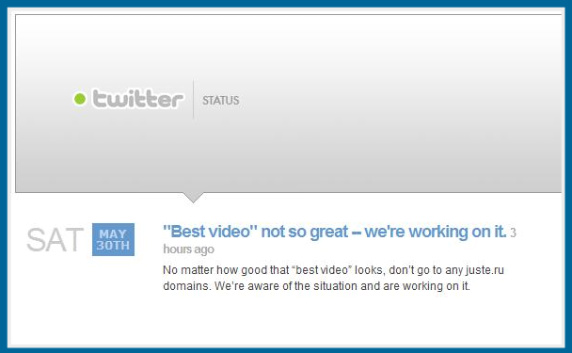There is a worm actively going around Twitter encouraging users to view the "best video" - which is cloaked in a short url (juste.ru/...). Twitter actively and quickly responded with a short, strange message: "No matter how good that “best video” looks, don’t go to any juste.ru domains. We’re aware of the situation and are working on it."
 This is as much about Twitter (and their rise to mass-popularity) as it is about the trend of short URLs. With services like Bit.ly and Tiny URL (which I use all of the time on Facebook and Twitter), it is impossible to know what lies on the click through... and that is dangerous because it requires you to trust the person sending the URL. Or, in today's case, trust that it was intentionally sent by the a trusted person.
This is as much about Twitter (and their rise to mass-popularity) as it is about the trend of short URLs. With services like Bit.ly and Tiny URL (which I use all of the time on Facebook and Twitter), it is impossible to know what lies on the click through... and that is dangerous because it requires you to trust the person sending the URL. Or, in today's case, trust that it was intentionally sent by the a trusted person.
Phishing is already rampant and difficult enough to detect / avoid with full URL strings (which is really the best way to validate whether the brand and destination match). The growing usage of short URLs makes detection nearly impossible until the click has already happened. Of course, this also means that spammers and phishers benefit and can leverage the popularity of Twitter (and other popular conversational exchanges).
